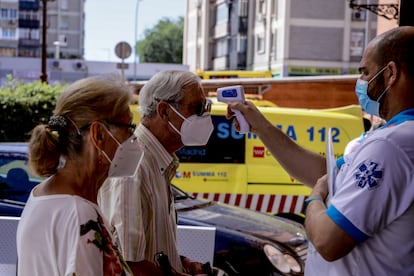Coronavirus deaths reported by Spain’s Health Ministry beginning to rise
The number of Covid-19 victims in the last week stands at 131, a figure 11 times higher than that reported just a month ago and twice the number reported on Tuesday

The rise in coronavirus infections that Spain has been seeing in recent weeks has prompted a spike in the number of Covid-19-related deaths due to the serious pneumonia that the pathogen causes. According to the data released on Wednesday by the Health Ministry, 131 people with the coronavirus have died in the last seven days, a figure that is twice that released by the ministry on Tuesday, and 11 times greater than the 12 deaths that were reported in the third week of July, just a month ago.
The deaths being caused by the virus are, however, even greater in number, but the delays in the notification of the data that the regions send to the ministry and that are subsequently made public mean that changes in trend are trickling through slowly.
There is no doubt that if the incidence increases, mortality will end up rising tooPere Godoy, president of the Spanish Epidemiological Society (SEE)
Regions such as Aragón and Catalonia have been reporting much higher numbers of deaths than those communicated by the ministry for the last three weeks now. The former, for example, reported on July 30 that 15 people had died in its hospitals and residences over the last seven days due to the coronavirus. The figure had shot up by the next week to 35 and last week the number was 72. Catalonia, meanwhile, has registered between 52 and 75 weekly victims since the end of June.
Pere Godoy, the president of the Spanish Epidemiological Society (SEE), believes that this increase in mortality is “the expected result in the rise of the circulation of the virus registered in recent weeks, with a number of outbreaks and community transmission present in a number of areas.” Despite this, “these sudden increases in mortality can also be due to delays in notification,” the expert explains.
“But there is no doubt that if the incidence increases, mortality will end up rising too,” Godoy adds, saying that “it is to be expected that this rise is not as steep as that registered in the spring, given that many of the people being diagnosed now are young, healthy and even asymptomatic.”
Daniel Lopes, a researcher from the computational biology and complex systems research group from the Catalan Polytechnic University, also predicts that the “mortality will grow because the number of cases has grown and it has done so with a delay because people who die do so an average of 18 days from the start of symptoms. “It is to be expected, however, that the number of deaths in relation to cases is lower than in March,” adds Lopes, “given that then there were a lot of people who did not get the treatment they needed, something that is not happening now.”
Madrid is still at the top of the list of new positives, with 2,207 in total and 1,535 in the last 24 hours
Other experts, however, are not hiding their “fear” should the situation get worse over the coming weeks. That’s the case of Santiago Moreno, the head of infectious diseases at the Ramón y Cajal hospital in Madrid. “First the young people have been infected, given that they are the ones who have moved around the most and have had social interaction,” he explains. “It’s true that they don’t normally have problems with the infection, but my fear is that they will have infected their parents, and that they will have infected their grandparents in turn. This can even happen if the grandchild has taken care not to go and see [their grandparents]. This could cause a growth in cases over the coming weeks in people who have a much more delicate prognosis.”
The Health Ministry also reported 6,671 new infections on Wednesday, as well as increases in the remainder of the data indicators. Madrid is still at the top of the list of new positives, with 2,207 in total and 1,535 in the last 24 hours. In all of Spain, the new cases detected on Tuesday and reported on Wednesday came in at 3,715.
Wednesday saw the second-highest number of infections since the deescalation of confinement measures, with the highest registered last Thursday, with 7,550. In total, the Health Ministry has recorded nearly 371,000 infections since the pandemic took hold in Spain, and 28,797 official victims.
The data from the ministry not only shows that Spain is facing a complicated situation in August due to the circulation of the virus, but also that it continues to have problems with, and delays to, the notification of the data from the regions that allows for a snapshot of the situation to be taken. Day after day, the figures being supplied by the ministry are lower than those offered by the press offices of the country’s regions, which have been in charge of controlling the epidemic since the end of the state of alarm, when full regional powers were returned from Madrid.
The data supplied on Wednesday indicate that a second wave of the epidemic is starting to take hold in Spain
One example of this is the figure of 3,715 new cases reported on Tuesday, a number that seems very high if it is compared with that offered by the Health Ministry in previous days. But the figure is not so great once the fact is taken into account that the average of new infections the previous week was 5,000 a day, and that what is happening is that nearly half of the tests carried out in one day end up being reported with several days’ delay.
Whatever the case, the data supplied on Wednesday indicate that a second wave of the epidemic is starting to take hold in Spain. The incidence over the last 14 days has now risen to 136 cases per 100,000 inhabitants, five times more than on Tuesday and 40 times more than a week ago. And the number of people who have developed symptoms over the last 14 days, one of the most relevant indicators for the experts, has reached a new high since this data point began to be recorded, with nearly 19,000 patients.
After several days that suggested the figures were stabilizing, the number of new cases has begun to rise once more according to the ministry report. The experts consulted by EL PAÍS, however, believe that more time is still needed before it can be determined whether these variations are due to real changes in the trend or are down to problems related to the system used to notify the data. Part of this rise, however, is not necessarily negative if it is due to the mass random testing that regions such as Catalonia and Madrid are carrying out in some neighborhoods and municipalities. This allows for the detection of asymptomatic cases in young and healthy people, and interrupts the chain of infection before it reaches vulnerable sections of society.
Pressure on hospitals
The latest data does, however, show a clear rise in the pressure on the healthcare system. Hospitalizations in the last week have risen 55%, with 1,336 new patients, while intensive care unit admissions have gone up by an even greater 71%.
These rises, the experts say, were predictable due to the significant growth in cases detected in the last two weeks, given that patients usually take between five and 12 days to develop serious symptoms that require hospitalization.
After the 2,207 cases in Madrid, Catalonia reported the second-highest number of new infections, with 1,016, followed by Aragón (632), Andalusia (590) and the Basque Country (475).
In terms of the cases detected on Tuesday and reported on Wednesday, Madrid saw 1,535, the Basque Country 472, Aragón 466, Andalusia 261 and Catalonia 244.
English version by Simon Hunter.
Tu suscripción se está usando en otro dispositivo
¿Quieres añadir otro usuario a tu suscripción?
Si continúas leyendo en este dispositivo, no se podrá leer en el otro.
FlechaTu suscripción se está usando en otro dispositivo y solo puedes acceder a EL PAÍS desde un dispositivo a la vez.
Si quieres compartir tu cuenta, cambia tu suscripción a la modalidad Premium, así podrás añadir otro usuario. Cada uno accederá con su propia cuenta de email, lo que os permitirá personalizar vuestra experiencia en EL PAÍS.
¿Tienes una suscripción de empresa? Accede aquí para contratar más cuentas.
En el caso de no saber quién está usando tu cuenta, te recomendamos cambiar tu contraseña aquí.
Si decides continuar compartiendo tu cuenta, este mensaje se mostrará en tu dispositivo y en el de la otra persona que está usando tu cuenta de forma indefinida, afectando a tu experiencia de lectura. Puedes consultar aquí los términos y condiciones de la suscripción digital.









































